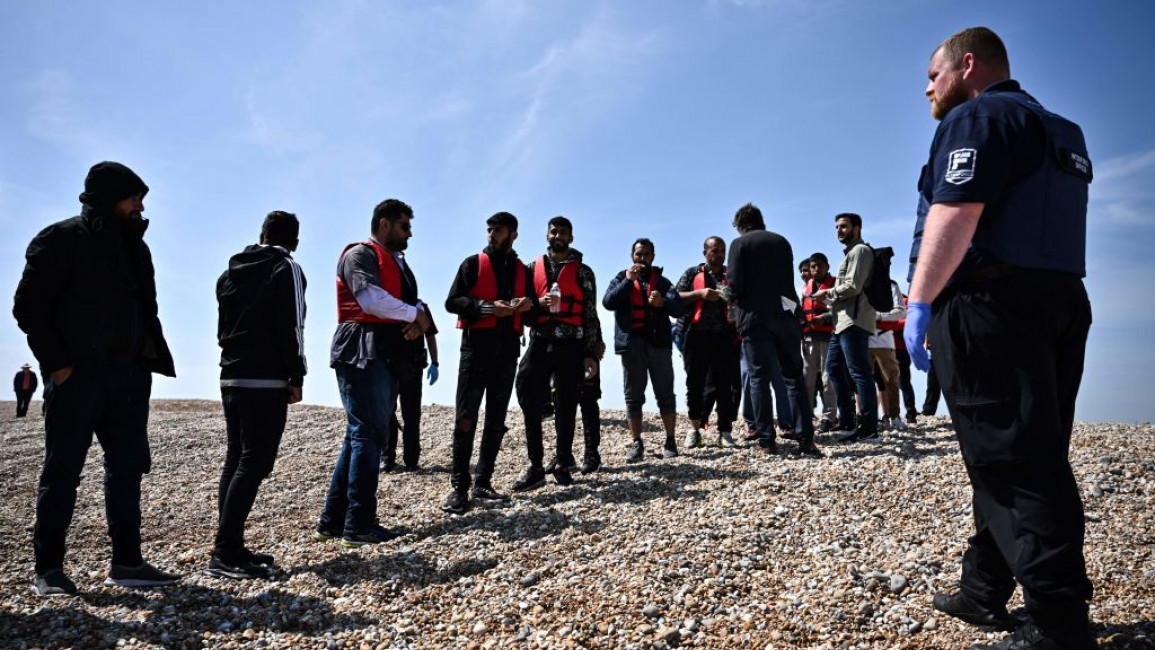Will the UK government's new 'migration bill' actually deter people seeking refuge?
The UK government announced on Monday a new bill it says will deter irregular travel to the UK via small boats by deeming them automatically inadmissible for asylum.
The legislation - championed by UK Prime Minister Rishi Sunak as one of his top "priorities" before the next general election - "will remove the incentive for people to risk their lives through these dangerous and unnecessary journeys", said a UK government statement.
Last year, over 45,000 people embarked on the perilous crossing from France to the UK, the vast majority coming from five countries: Syria, Afghanistan, Iraq, Iran, and Albania.
Critics of the bill argue that few will be deterred from making the perilous journey, given the lack of available safe routes to the UK for people fleeing war, poverty, and prosecution. Under the new system, which faces legal challenges, individuals caught by authorities will be detained and unable to exercise their legal right to claim asylum.
If you come to the UK illegally you will be stopped from making late claims and attempts to frustrate your removal.
— Rishi Sunak (@RishiSunak) March 7, 2023
You will be removed in weeks, either to your own country if it is safe to do so, or to a safe third country like Rwanda. pic.twitter.com/8NFaa4DbwT
How is the bill different from previous UK government migration policies?
The UK Conservative government has unveiled a slew of policies aimed at tackling irregular migration over the last two years, in a way that appeals to right-wing voters.
The Nationality and Borders Bill - announced in July 2021 under Boris Johnson and passed into law in April 2022 - sought to create a tiered migration system that treats asylum claims differently, depending on an individual's method of arrival.
The legislation included provisions such as the use of "offshore processing centres" and was closely tied to its Rwanda deportation policy, a controversial scheme that could see asylum seekers denied the right to remain in the UK, and deported to the Central African country. The scheme is currently held up in UK courts.
The "Illegal Migration Bill" announced by Sunak’s government this week goes one step further by automatically "detaining and swiftly removing" anyone who arrives in the UK via what they deem to be an "illegal route" such as a small boat crossing.
This is despite the fact that most individuals can’t apply for humanitarian visa schemes to reach UK shores. The exceptions are Hong Kongers, Ukrainians, and Afghans, although a vast number of Afghans are taking small boat crossings as UK government relocation schemes failed to swiftly extend help to vulnerable individuals.
The new proposed legislation states that detainees will be sent back "to their home country if safe" or "another safe third country such as Rwanda".
Ahead of their deportation, individuals will be "prevented from accessing" the UK's modern slavery support and will not have any "challenges or human rights claims" heard until after their removal.
The Refugee Convention, which the UK is a signatory to, states that people have the right to claim asylum in a country upon arrival and should not be "penalised for their illegal entry or stay".
“It breaches the Refugee Convention”
— BBC Newsnight (@BBCNewsnight) March 7, 2023
UK Rep. of the UN Refugee Agency, Vicky Tennant, says “we’re very concerned” about the Illegal Immigration Bill #Newsnight | https://t.co/P0zxS1DNGF pic.twitter.com/SAuC83Qjjy
"Any restrictions on liberty imposed on persons exercising this right needs to be provided for in law, carefully circumscribed and subject to prompt review," a UNHCR spokesperson told The New Arab.
"Detention of asylum seekers en-mass simply for claiming asylum is not considered to be a legitimate purpose."
Is there any evidence the legislation will deter people from making small boat crossings?
UK Home Secretary Suella Braverman told the House of Commons on Monday that the law would "stop the boats that are bringing tens of thousands of our shores".
Refugee campaigners have called this claim "utter rubbish".
"There is a fixation on the bill as a deterrent, but we all know that's not true," said Maddie Harris from Humans for Rights Network to The New Arab.
Harris said a spike in the number of boat crossings last year after the Rwanda scheme was announced shows people seeking refugee will continue to risk the dangerous journey unless safe routes are made available to them.
In 2022, 1,109 boats were detected arriving in the UK compared to 1,034 boats detected the year before.
The day after the Rwanda policy was publicised, The Guardian spoke with 22 migrants, who all arrived by boat that morning, and said they would "take their own lives, rather than face removal from the UK to Rwanda".
"The backlog of cases will only get worse and people will be stuck in a perpetual state of limbo," warned Harris.
The number of countries the UK can send individuals to is small, given Britain has no operating returning deals with the European Union and the Rwanda deportation is stalled in the courts because of legal challenges
Tim Noar Hilton, chief executive of Refugee Action, told The New Arab: "These deterrence policies will never work because a tiny minority of people fleeing war and persecution around the world will always want to come to the UK to seek safety.
"There's a deep and glaring racism at the heart of the government's refugee policy that shuts and then locks the door on refugees from Africa, the Middle East, Afghanistan, and most of Asia."



